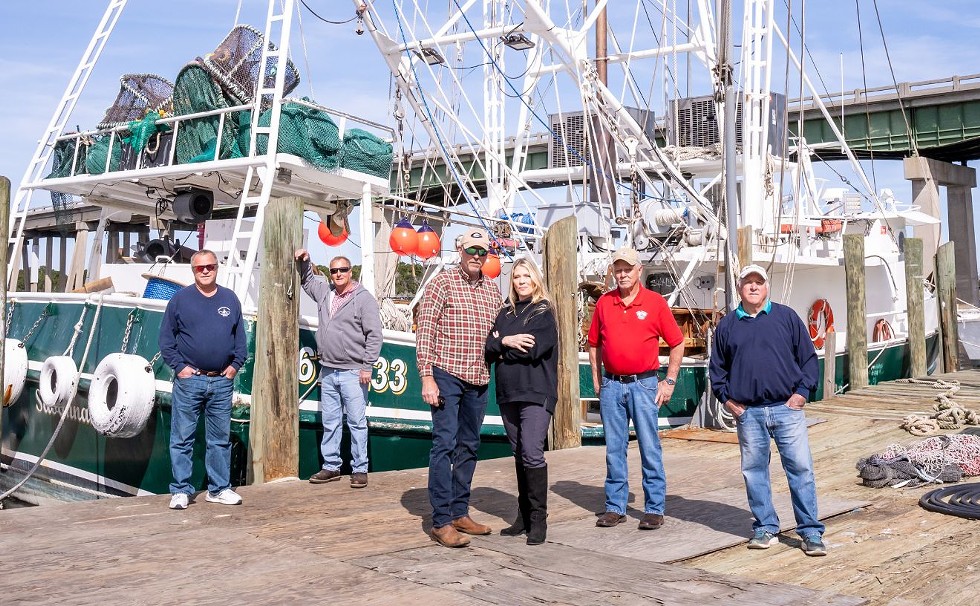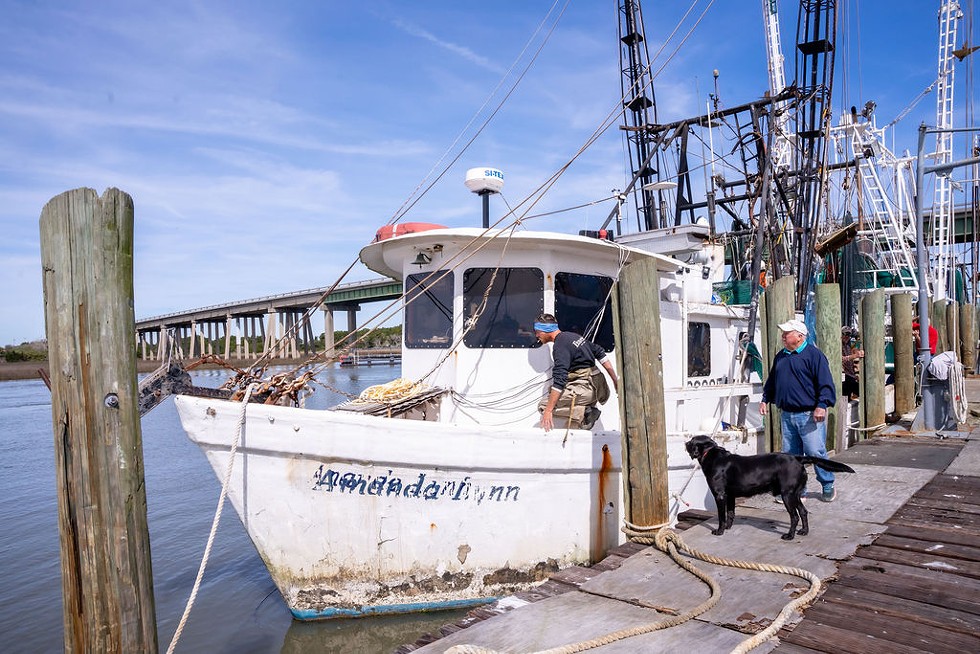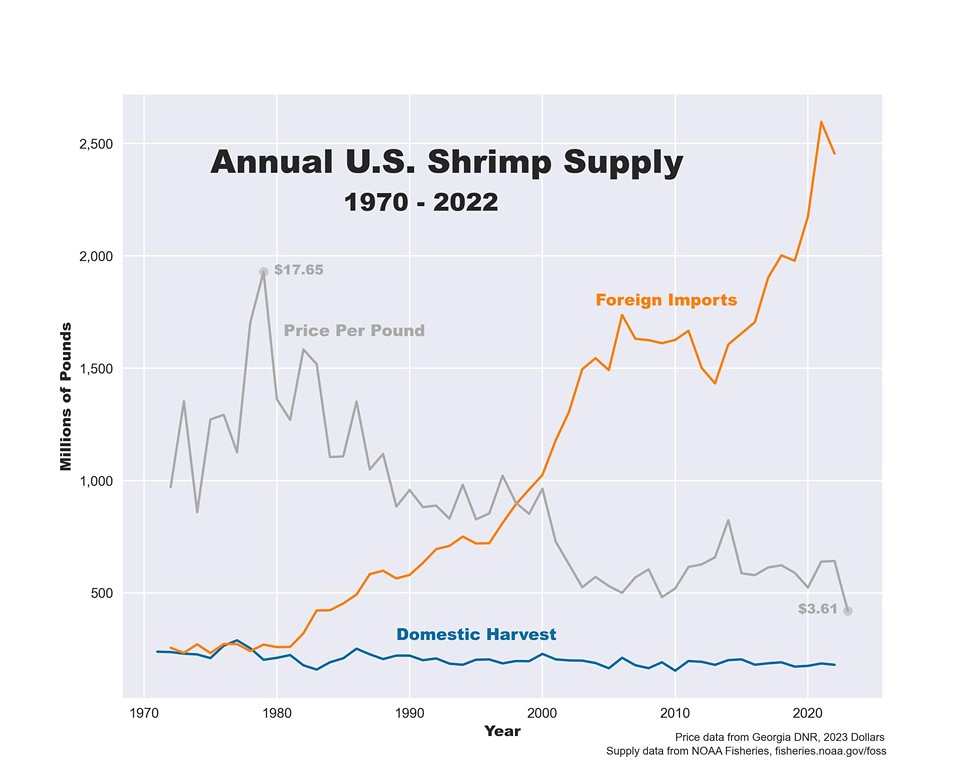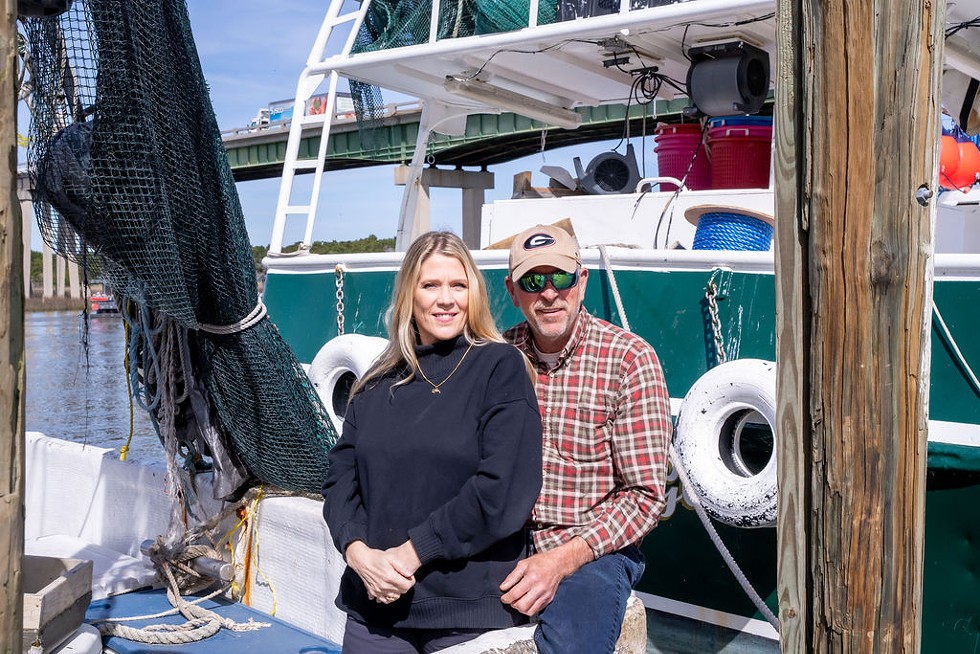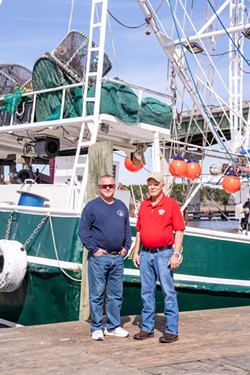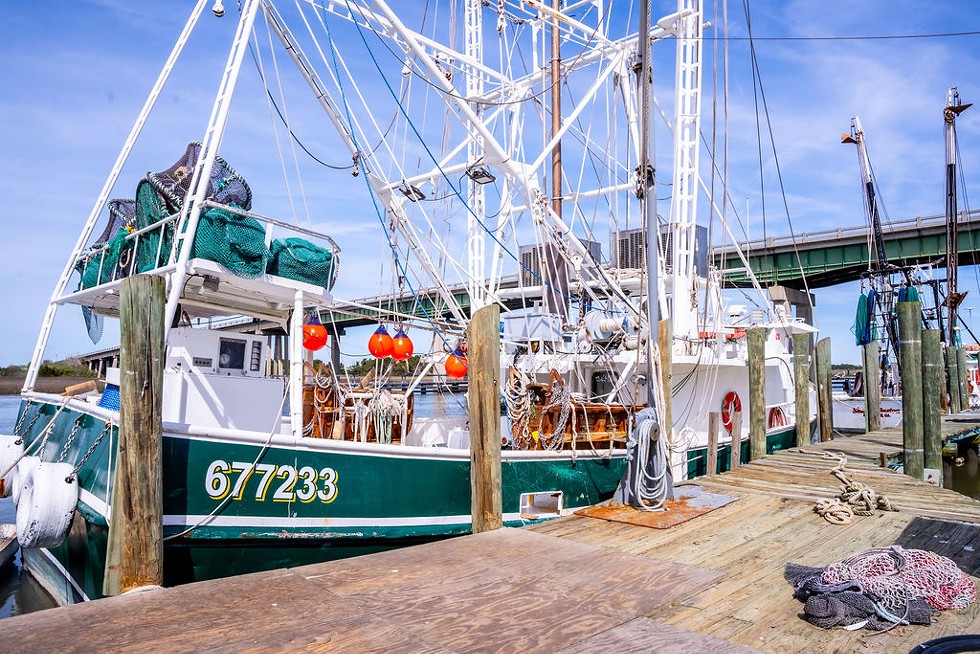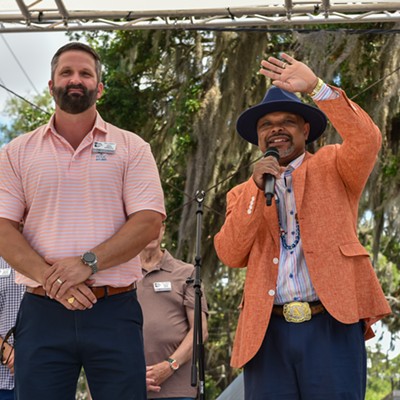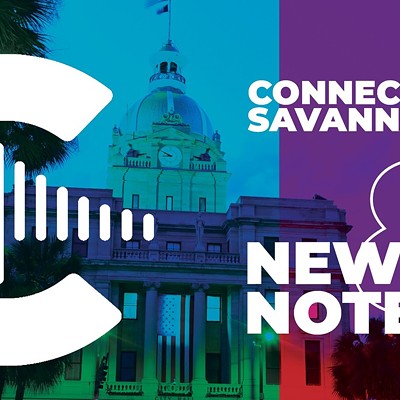It’s quiet at the Lazaretto Creek dock Pat Mathews has operated for thirty years, but hopefully not for long. When Coastal Georgia’s shrimping season starts again this spring and summer, shrimpers are optimistic it will be better than the last one—for some, it must be.
In a word, “difficult,” said Dee Kicklighter of their most recent shrimping season. Kicklighter, who has worked with Mathews for about eight years, has seen first-hand how the unpredictability of the business can be costly. “You plan for something to be one price, and then the next week you come back, and it could be potentially thousands of dollars more, depending on what you’re dealing with,” he said of fluctuating prices, including fuel.
Over the years, Mathews said the ever-changing cost of fuel has taken a toll on the number of shrimpers in the industry. “We had about 15 shrimp boats here at the time,” he remembers, when he started managing his family’s Tybee dock and Lazaretto Packing Co. in 1993. “It was a thriving industry. We were all doing great,” he said.
Since then, the price of diesel has more than tripled, narrowing profit margins to the point that many local shrimpers have opted to stay dockside. According to the Coastal Resources Division of Georgia’s Department of Natural Resources, in 1998 the state issued 520 permits for commercial shrimp trawling. In 2023, 209 permits were issued—a 60 percent decrease over the last 25 years.
As a business that tends to be generational, it’s easy for shrimpers to see how much has changed over the years. Mathews is the fourth generation of a family who has been in the seafood industry for over a century. “My great grandfather was in the seafood business in Savannah. He started out in Bay Lane.” Their family seafood market, Frank Mathews Seafood, was run by his grandfather, then father until nearly 2000 at Congress and Barnard.
“I just do it because it’s in my blood,” said Mathews.
JUMBO PROBLEMS SERVED
In the mid 1970s, domestic and foreign sources supplied roughly the same number of shrimp to the U.S. market, according to data from the National Oceanic and Atmospheric Administration (NOAA). That changed in the early 2000s when low-cost imports first started flooding the market.
The report “A Crisis of Our Own Making” published by the Southern Shrimp Alliance, describes the role of international financial institutions, such as the World Bank, in funding shrimp aquaculture and “pouring billions of dollars to spread the industry throughout Asia and Latin America,” substantially injuring the American shrimp industry.
India, Ecuador, Indonesia and Vietnam are the top four suppliers of imported shrimp, which today makes up about 90 percent of the U.S. market.
Many shrimpers will cite the North American Free Trade Agreement (NAFTA), which reduced trade barriers with Canada and Mexico, as one of the first causes for the market’s decline. Federal trade laws, unfair competition, and the lack of tariffs also boil the pot, they say.
“Most of the challenges today revolve around federal trade issues and quite frankly, the inability or the unwillingness of our federal government to combat unfair trade practices,” said Georgia State Representative Jesse Petrea.
“You have countries like Ecuador who intentionally dump, pour in masses of foreign, pond raised shrimp into the American market, and they do that oftentimes intentionally to dominate the market,” Petrea said. “Some of these countries are paying no tariffs, there’s no tariffs at all.”
Those challenges weigh heavily on coastal Georgia shrimpers.
“This is all I've ever done, and it’s just gotten so bad in the last couple of years that it’s hard to make any money…and it’s just getting worse and worse every year,” said Jeff Dubberly, whose family has owned and operated a dock in Coffee Bluff since the early ‘70s.
In addition to their dock and boats, Jeff and his brother Mike oversee Dubberly’s Seafood and know all too well competing with foreign imports is risky business. Referring to this past shrimping season, Mike said, “We had an abundance of shrimp, but the actual prices that we were receiving were almost so low that you could [barely] break even.”
In 2023, the average price per pound was $3.61, according to the Georgia DNR, a number that has been in severe decline over the past several decades.
Walter “Big John” Smith Jr. of Smith & Sons Seafood in Darien, Georgia has been running his family’s shrimp processing business for 33 years. The business was started in 1955 by his father, Walter “WM” Smith Sr., and today includes a large network of docks from Virginia all the way to Texas. “Mostly we buy from the docks where the boats sell to the dock and we’ll go by and pick up the product, bring it back out for selling and we’ll process it. We sell a lot of it fresh to grocery store chains up the East Coast,” Smith said.
Smith, who once had several pickup locations in the greater Savannah area, now only has two—Lazaretto Packing Co. and Nelson’s Quality Shrimp Company.
Increasing labor costs, the price of packaging materials, and competition with imports make keeping up with prices immensely challenging. “You have all these things going up and shrimp is not going up, it’s actually going down due to so much volume,” he said.
Relief came during the COVID-19 pandemic when imports came to a halt, but as international shipping started up again, those moments of reprieve quickly dissipated. “During COVID, a lot of containers coming from overseas were delayed. So, when those containers hit, they all hit at one time,” said Smith, who still has shrimp from last year.
“We’re sitting on over 10 million dollars worth of product.”
It’s not just Georgia shrimpers contending with the negative effects from imports. North Carolina, Texas, Louisiana, Florida and other coastal states are also feeling the friction of narrowing profit margins that threaten their way of life.
On Nov. 14 2023, the U.S. Department of Commerce International Trade Administration initiated an antidumping and countervailing duty investigation after the American Shrimp Processors Association (ASPA) filed a petition. On Dec. 8, the U.S. International Trade Commission (USITC) determined “that there is a reasonable indication that a U.S. industry is materially injured by reason of imports.” Ecuador, India, Indonesia, and Vietnam were cited as the key countries negatively impacting the U.S.
The Trade Administration is continuing their examination of countervailing duty and less-than-fair-value investigations, with a final determination deadline scheduled this spring.
Smith has been a member of the American Shrimp Processors Association for about 10 years and is hopeful the investigation will lead to more tariffs on imports. “We're going to try to get some of this tariff collected and send it back to the industry to help with insurance and fuel and repair on boats and give everybody a jump start again,” he said.
“You’re not competing against another company,” said Pat Mathews. “You’re competing against another country, that’s the problem.”
A SHRIMP STATE OF MIND
Paige Morrison has been outspoken about her views to support the shrimpers and protect their livelihood. From where she’s standing, advocating for them means supporting her own family since Morrison has been married to a shrimper, Stevie, for 35 years.
In July, 2023 she founded the Georgia Commercial Fisherman’s Association (GACFA) and became its president. “When I first met my husband, I didn't know that shrimp had heads. It was a shock to me. Now I'm running an eight-state coalition for shrimping.”
Morrison also serves as the state of Georgia’s director for the U.S. Shrimpers Coalition, which represents eight coastal states: North Carolina, South Carolina, Georgia, Florida, Alabama, Louisiana, Mississippi and Texas.
She went from here to Texas, visiting shrimpers and talking to them about starting up their shrimp associations again. “This has been an important step, for all of these states, for us, to get all this going to revive [it] and we're going to take back our market.”
“Since Paige has taken over, she's really gotten a lot of interest back into it and I think that this new association we have is going to be really helpful,” Mike Dubberly said.
The U.S. Shrimpers Coalition and the GACFA is focusing on addressing the need for better oversight and testing of imported shrimp, as well as imposing tariffs and fair trade and more protections for shrimpers. “We're working with legislators to get not only state laws but federal laws [passed]. We’re working with Senator Warnock's office, Senator Ossof, Congressman Buddy Carter's office, State Representative Buddy DeLoach and Jesse Petrea are all staunch advocates and helpers for us.”
“I just got money in our budget this year for new seafood inspectors,” said State Representative Jesse Petrea. “I got an appropriation this year that I requested from the Department of Agriculture to hire new seafood inspectors.”
“Why do we want that? We want that for a couple reasons. Number one, we don't want any hold up in making sure we can move Georgia wild products. But secondly, we want to make sure that foreign products are being inspected appropriately.”
Petrea said he’s also reached out to congressmen on the federal side to hold foreign countries accountable and make sure federal trade laws are being enforced. In the future, Petrea hopes to create a shrimp task force that would help give a louder voice to these concerns locally.
At the end of February, the Georgia House unanimously voted to make white shrimp the official state crustacean, thanks to House Bill 1341.
“It was an initiative by the first lady of the House of Representatives, Speaker John Burns’ wife, it was her idea. And it's all about the same thing, we're trying to just continue to show the importance of the Georgia white shrimp,” he said. “It may seem trivial, but it sends a message.”
It’s a message Morrison hopes to share loud and clear. “We can't allow an American industry to be taken over by foreign interests,” Morrison said. “Shrimping is an American industry that has to be saved.”
Without it, shrimpers fear much would be impacted by its absence. “There will be a lot of people out of work. You have the people who build nets, you have the people who supply stuff to the boats. It's not just the fishermen that's going to lose, its other places too,” said Jeff Dubberly.
“It’s our heritage and it's not only Georgia, it’s South Carolina, Louisiana, Texas,” said his brother, Mike. “I mean, most people [who] do it are second or third generation. I'm second, my son's the third. So, our whole family is involved and it's just a way of life.”
“If we lose shrimping, we're going to lose a way of life that is particular to the American experience. We have the best oceans, the best rivers, the best shrimp, the best oysters in the world,” Morrison said.
“But if you're looking at a reason that right now the market is not there, it is because without question, consumers all day, every day will buy foreign products because they are cheaper before they buy domestic products,” said Petrea.
EAT MORE LOCAL SHRIMP
Better labeling at restaurants of wild caught Georgia shrimp is one of the many goals Morrison has for the Georgia Commercial Fisherman’s Association. Referring to consumers, she said, “They shouldn't walk into a restaurant that has shrimp boats on the wall and shrimp nets…and then serve shrimp from Vietnam that was grown in a hole with chicken cages over it, feeding it chicken poop.”
“Consumers have a right to know what they're eating.”
The Dubberly brothers agree. “Wild caught shrimp taste a lot better than the imports and a lot of them don't know that they're eating imports when they go to some of the restaurants,” said Jeff.
“We as consumers hold the solution for our shrimpers, the answer is to demand—from wherever you buy your seafood—Georgia wild shrimp,” said State Representative Jesse Petrea, who added that only an extremely small subset of restaurants in Savannah currently sell wild caught Georgia shrimp.
“You can turn it around pretty quick if the following happened: if people went to their grocery store and went down to Publix and they said…no, no, no, I shop here regularly. I want Georgia wild shrimp. If enough people did that, guess what would happen? The grocery store would start routinely carrying Georgia wild shrimp,” Petrea said.
Petrea and Morrison want to continue educating the public about the health benefits of eating and investing in local shrimp. Marketing efforts with the Department of Agriculture are in the works to help promote what Georgia shrimpers believe is the best product in the world—and it’s right here.
“That's what we need, to educate the public a little bit and let them know the difference. I think that's probably our biggest challenge because we only catch a small portion of what's eaten in this country,” said Mike Dubberly.
“We're trying to encourage restaurants and businesses to go straight to the shrimper, go straight to Pat Mathews, buy straight from him, buy straight from Buddy Nelson, buy straight from Frank Dubberly, from the people who do that,” Morrison said.
When the Department of Natural Resources officially announces the beginning of the spring shrimping season, many are hopeful it will be a good one.
“Most of the negative effects on the shrimp fishery in Georgia are not related to the population of shrimp in our water,” said Eddie Leonard, a DNR Coastal Resources Division marine biologist. In general, he said, the population of the fishery has been stable.
The fishery is considered the area from the beach to three miles out. Beyond three miles begins federal waters, an area open to shrimp harvesting outside of the state’s season. “In the spring, the commissioner can open the fishery as early as May 15. That very rarely happens. Usually, it’s the beginning of June,” Leonard said.
Shrimpers anticipate there will be plenty of shrimp to catch, based on the mild weather and warmer temperatures over this past winter.
“Hopefully this year is going to be one of those years where we'll have a decent amount of shrimp and we'll get a price where we can make some money,” said Mike Dubberly. A lot of people are starting to realize that the domestic product is better, safer to eat than the imports.”
“It's one of the most economical, sustainable, renewable resources that we can have,” Paige Morrison said. “I think that growing this and not letting this industry die is one of the most important things I've ever done.”
“It’s an amazing community and it’s worth fighting for.”

